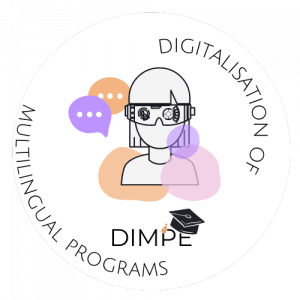
DIMPE – Digitalisation of multilingual programs in the EHEA
Project Duration: 2022-2025
The development of linguistic competence is one of the eight key competencies promoted by the EC. Despite MemberStates commitment to the promotion of foreign languages through enacting initiatives for the promotion of bilingualism, i.e., through YUFE and through the improvement of the effectiveness of language teaching in educational settings(Council on Multilingual and Language Skills Development, 2017), more actions in this area are imperative to promote further multilingualism and expand cultural understanding, acceptance and values.
For instance, Europe has not yet implemented a language flagship program similar to the USA. However, multilingualism is entrenched in Europe’s Foundation and cultural diversity. Consequently, it should be promoted at all levels. Evidence-based policymaking could contribute to this end so that more extensive and effective initiatives and actions are undertaken to prepare students for international mobility and guide them in becoming more competitive in a constantly demanding and evolving international labor market. A multilingual European society will facilitate cohesion, inclusion, intercultural understanding, and acceptance.
Higher Education Institutions (HEIs) can set the cornerstone to achieving this goal by adopting practices and undertaking novel endeavors to promote multilingualism. Currently, there is not a consensus for quality practice, andmany European HEIs, such as the ones involved in this project, need support for developing more potent pedagogical practices to promote multilingualism. Further, in most academic institutions approaches in foreign language teaching are driven by approaches used in first language teaching, without any significant adaptation of the teaching material, speech,or content in order to immerse students in constructive learning experiences.
Moreover, many incoming exchange students complete their mobility exchange programs without becoming immersed in the target culture or using the target language, except English. In many cases, linguistic and cultural experience is undermined. Such experiences do not help to accomplish the language objectives of the EU: to speak the native tongue in addition to two foreign languages.Consequently, program coordinators, directors, teachers, administrative staff, and students are in dire need of support and guidance to adopt practices that promote multilingual education. COVID-19 pandemic means more obstacles, which can be sorted out by digitalizing those multilingual programs.
Objectives:
- support of multilingual program coordinators and directors in designing, developing, implementing, managing, and evaluating multilingual programs
- guide and support of lecturers and students participating in multilingual programs in order to increase their intercultural and linguistic competences
- promotion of the learning of the home language and culture to incoming exchange students participating in multilingual programs by providing decision-makers with internationalization strategies and actions
- dissemination of previous results in order to reach multiple target groups within the educational community and through diverse strategies and channels
Facebook | Website | Online Tool | Research Paper
The project is financed by Erasmus+ KA2: 2021-1-ES01-KA220-HED-000022963
